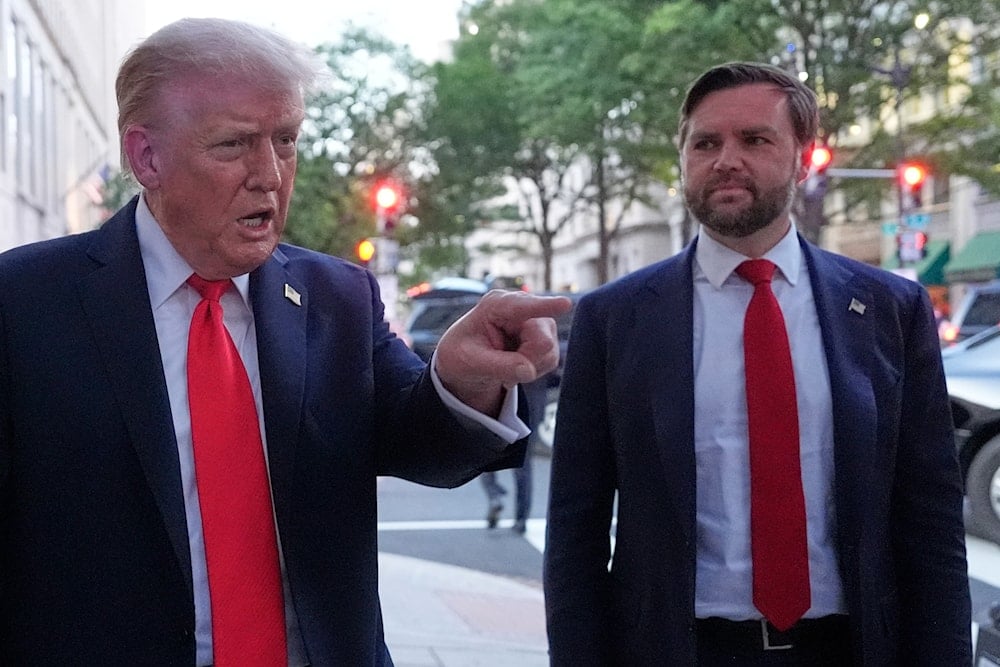Trump’s 'strike' on Venezuela boat sparks legal, political concern
While supporters hail Trump's strike, critics question its legality and the president’s unchecked military power.
-

US President Donald Trump talks to reporters as he arrives for dinner at a restaurant near the White House, Tuesday, Sept 9, 2025, in Washington, with Vice President JD Vance (AP)
Earlier this month, US President Donald Trump allegedly ordered a military strike on a suspected drug-smuggling speedboat carrying 11 people from Venezuela. The attack, which US officials claimed targeted members of the Tren de Aragua gang, was framed as a decisive move to block narcotics shipments into the country.
For Trump’s supporters, including Sen. Lindsey Graham, the strike was a clear message to drug cartels. Graham, who urged Trump to “blow up something” at the start of his second term as a show of strength, praised the action, saying it “works for me.”
Yet, the incident has deepened divisions within the Republican Party, with critics warning it contradicts Trump’s earlier campaign pledge to keep the US out of foreign conflicts. While some Republicans, like Sen. Jim Risch, insisted the strike targeted “narco-terrorists” and saved countless lives, others were unconvinced. Sen. Rand Paul criticized the administration for bypassing due process, calling it “despicable” to glorify executions without trial.
The Trump administration justified the strike as a necessary step to stop the flow of drugs, despite no proof in this regard being submitted. Vice President JD Vance defended the operation, arguing that “killing cartel members who poison our fellow citizens is the highest and best use of our military.”
But the lack of transparency surrounding the mission has raised alarms in Washington. A bipartisan Senate briefing was abruptly canceled, and the rescheduled session failed to provide key details on the legal grounds for the operation.
Questions over Trump’s military authority
The alleged Venezuelan boat strike is the latest example of Trump’s increasingly aggressive use of military power without explicit congressional approval.
Sen. Mark Kelly, a Democrat and former Navy pilot, questioned the legality of the operation. “I don’t know if this was legal or not,” he said, warning that US servicemembers could face legal jeopardy.
Democratic leaders, including Sen. Jack Reed, have demanded full transparency from the administration. Reed warned that if Trump exceeded his constitutional authority, Congress must consider restricting funds for further unauthorized military operations.
Meanwhile, Republicans such as Sen. Josh Hawley defended Trump’s actions, arguing that the president acted within his Article II authority as commander-in-chief. To them, preventing drugs from entering the US justifies rapid, unilateral decisions.
Venezuela’s response
Venezuelan Information Minister Freddy Nanez accused US Secretary of State Marco Rubio of misleading Trump with an AI-generated video that was later shared by both the White House and Trump himself as supposed proof of the strike. Nanez argued the footage showed “cartoonish” explosions and distortions, calling it fabricated evidence to justify escalation.
Venezuelan lawmaker Gilbert Jimenez further questioned the US account, stressing that traffickers were unlikely to operate in heavily patrolled waters and warning that Washington was using the narrative as a pretext for aggression.
America First and a shifting GOP strategy
Trump’s first term ushered in a period of US neo-isolationism. However, his second term appears to signal a more muscular, unilateral approach under the banner of America First.
The Venezuelan strike, along with past moves such as dropping bombs on Iran’s nuclear sites and rebranding the Department of Defense as the Department of War, demonstrates Trump’s willingness to push the boundaries of presidential power.
While some Republicans see Trump’s approach as decisive leadership, others fear it erodes constitutional checks and balances. The result is an ongoing struggle within the GOP over whether America First should mean restraint abroad or aggressive use of military force.
Nonetheless, Democratic lawmakers remain firm in demanding explanations for the strike. They argue that the absence of legal clarity undermines both the rule of law and the safety of US forces carrying out such missions.

 4 Min Read
4 Min Read










